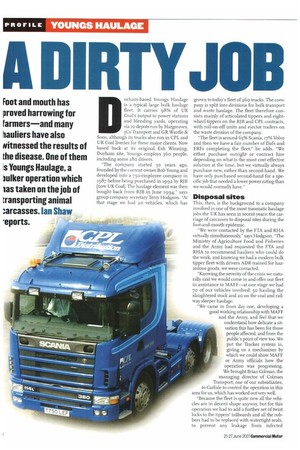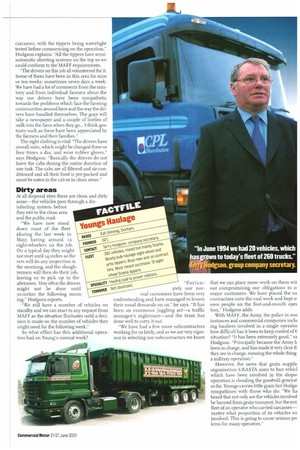Iffif.10
Page 40

Page 41

If you've noticed an error in this article please click here to report it so we can fix it.
urham-based Youngs Haulage is a typical large bulk haulage fleet. It carries 98% of UK Coal's output to power stations and blending yards, operating via in depots run by Hargreaves, 3Cs Transport and GR Wardle & Sons, although its trucks also run in CPL and UK Coal liveries for these major dients. Now based back at its original Esh Winning, Durham site, Youngs employs 360 people, including some 280 drivers.
"The company started 30 years ago, founded by the current owner Bob Young and developed into a 750-employee company in 1987 before being purchased in 1992 by RJB [now UK Coal]. The haulage element was then bought back from RJB in June 1994," says group company secretary Terry Hodgson. "At that stage we had 20 vehicles, which has
grown to today's fleet of 260 trucks. The company is split into divisions for bulk transport and waste haulage. The fleet therefore consists mainly of articulated tippers and eightwheel tippers on the RJB and CPL contracts, with roll-on-off units and ejector trailers on the waste division of the company.
"The fleet is around 65% Scania, 17% Volvo and then we have a fair number of Oafs and ERFs completing the fleet," he adds. "We either purchase outright or contract hire depending on what is the most cost-effective solution at the time, but we virtually always purchase new, rather than second-hand. We have only purchased second-hand for a specific job that needed a lower power rating than we would normally have."
Disposal sites
This, then, is the background to a company involved in one of the most traumatic haulage jobs the UK has seen in recent years: the carriage of carcasses to disposal sites during the foot-and-mouth epidemic.
"We were contacted by the FTA and RHA virtually simultaneously," says Hodgson. "The Ministry of Agriculture Food and Fisheries and the Army had requested the FTA and RHA to recommend hauliers who could do the work, and knowing we had a modern bulk tipper fleet with drivers ADR trained for hazardous goods, we were contacted.
"Knowing the severity of the crisis we naturally said we would come in and offer our fleet in assistance to MAFF—at one stage we had 70 of our vehicles involved: 5o hauling the slaughtered stock and 20 on the coal and railway sleeper haulage.
"We came in from day one, developing a good working relationship with MAFF and the Army, and feel that we understand how delicate a situation this has been for those
people affected, and from the public's point of view too. We put the Tracker system in, giving us a mechanism by which we could show MAFF or Army officials how the
operation was progressing.
We brought Brian Colman, the managing director of Colman
Transport, one of our subsidiaries, to Carlisle to control the operation in this area for us, which has worked out very well.
"Because the fleet is quite new all the vehicles are in decent shape anyway, but for this operation we had to add a further set of twist locks to the tippers' tailboards and all the rubbers had to be replaced with watertight seals, to prevent any leakage from infected carcasses, with the tippers being watertight tested before commencing on the operation," Hodgson explains. "All the tippers have semiautomatic sheeting systems on the top so we could conform to the MAFF requirements.
"The drivers on this job all volunteered for it. Some of them have been in this area for nine or ten weeks; sometimes seven days a week. We have had a lot of comments from the ministry and from individual farmers about the way our drivers have been sympathetic towards the problems which face the farming communities around here and the way the drivers have handled themselves. The guys will take a newspaper and a couple of bottles of milk into the farm when they go... I think gestures such as these have been appreciated by the farmers and their families."
The right clothing is vital: "The drivers have overall suits, which might be changed three or four times a day, and wear rubber gloves," says Hodgson. "Basically the drivers do not leave the cabs during the entire duration of one task. The cabs are all filtered and air-conditioned and all their food is pre-packed and must be eaten in the cab or in clean areas."
Dirty ar eas
At all disposal sites there are clean and dirty
areas the vehicles pass through a disinfecting system before they exit to the clean area and the public road.
"We have now stood down most of the fleet (during the last week in May) having around 12 eight-wheelers on the job. On a typical day they might not start until 4:oohrs as the vets will do any inspection in the morning, and the slaughtermen will then do their job, leaving us to pick up in the afternoon. Very often the drivers might not be done until or:oohrs the following morning," Hodgson reports.
"We still have a number of vehicles on standby and we can react to any request from
MAFF as the situation fluctuates until a decision is made on the number of vehicles they might need for the following week." TOWED 191). "Fortunately our normal customers have been very understanding and have managed to lessen their usual demands on us," he says. "It has been an enormous juggling act—a traffic manager's nightmare—and the team has done well to carry it out.
"We have had a few more subcontractors working for us lately, and as we are very rigorous in selecting our subcontractors we know
that we can place more work on them wit out compromising our obligations to a, major customers. We have placed the su contractors onto the coal work and kept o own people on the foot-and-mouth ()per tion," Hodgson adds.
With MAFF, the Army, the police in son instances and commercial companies inclu ing hauliers involved in a single operatio how difficult has it been to keep control of ti situation? "It has been extremely good," sa Hodgson. "Principally because the Army h been in charge, and has made it very clear if they are in charge, running the whole thing a military operation."
However, the news that grain supplk organisation UKASTA aims to ban vehicl which have been involved in the disprx operation is clouding the goodwill generat so far. Youngs carries little grain but Hodgs, sympathises with those who do: "We ha heard that not only are the vehicles involved be banned from grain transport, but the ent fleet of an operator who carried carcasses— matter what proportion of its vehicles WE involved. This is going to cause serious prc lems for many operators."
































































































